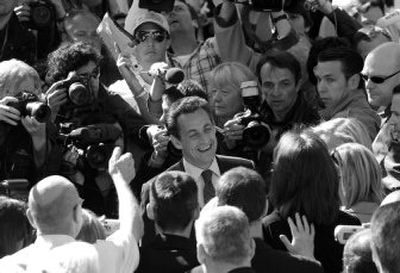It’s right vs. left in French runoff

PARIS – French voters Sunday chose ruling party candidate Nicolas Sarkozy and Socialist Segolene Royal to compete in the French presidential runoff in two weeks, with a massive voter turnout backing a generational shift of the country’s leadership.
Sarkozy, the tough-talking former interior minister and candidate of the Union for a Popular Movement, won 30 percent of the vote, and Royal, who has cast herself as a maternal protector vying to be France’s first female president, received 24 percent, according to preliminary official returns.
Eighty-four percent of the 44.5 million eligible voters cast ballots – an apparent record in a first-round presidential ballot in France – reflecting the urgency of an election that centered on the country’s fear of economic decline at home and diminishing influence abroad. The huge turnout also underscored voter enthusiasm for the more modern, personality-driven, American-style campaigns to replace outgoing two-term President Jacques Chirac.
The election results indicate that French voters want a clear choice in the decisive May 6 run-off, which will be a classic right-left showdown pitting the hard-line, pro-business, pro-American Sarkozy, 52, against Royal, 53, who advocates greater spending for social welfare programs and supports more multipolar global relations. Royal, a mother of four, is the first woman to advance to the second round in a French presidential race.
“I want to tell all the French who are scared, who are scared of the future, who feel fragile, vulnerable, who find life harder and harder, I want to tell them that I want to protect them,” Sarkozy said in a victory speech to supporters at a concert hall near the Champs Elysees. The comments clearly were aimed at those voters who tell pollsters they find Sarkozy, the son of a Hungarian immigrant, too tough and divisive.
Royal, speaking to boisterous supporters in her voting district town of Melle in western France, said she wanted to lead “the fight for change, so that France can stand up again, to get optimism back.” In a clear swipe at Sarkozy – though she didn’t name him – Royal said she wanted to “change France without brutalizing it.”
Both Sarkozy and Royal pledged major changes to shake France from its doldrums, and both promise a less imperial presidency that is more in touch with the people. Whoever wins will be the first French president from the generation born after World War II, heralding a more modern style at the Elysee Palace.
Twelve candidates competed in Sunday’s election. Francois Bayrou, 55, of the small Union for French Democracy party, who had billed himself as a centrist between Sarkozy and Royal, came in third with 18 percent of the vote, and Jean-Marie Le Pen, 78, a hard-right anti-immigration nationalist, ranked fourth with 11 percent, according to preliminary results.
The remaining 17 percent was split among eight minor political groups, including three Trotskyist political parties, the French Communist Party and the ecologically minded Greens.